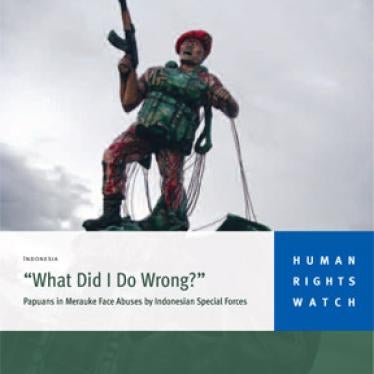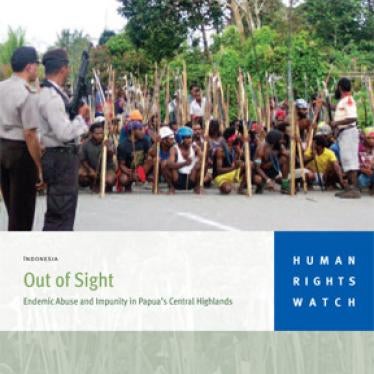(New York) – The Indonesian government should conduct independent and impartial investigations into abuses by its elite special forces, Kopassus (Komando Pasukan Khusus), Human Rights Watch said in a report released today.
The 16-page report, “‘What Did I Do Wrong?’: Papuans in Merauke Face Abuses by Indonesian Special Forces,” documents how Kopassus soldiers operating in the town of Merauke, in Indonesia’s easternmost province of Papua, arrest Papuans without legal authority, and beat and mistreat those they take back to their barracks.
Kopassus’ record of human rights violations and its failure to hold the abusers accountable spans its operations across Indonesia, particularly since the 1970s in East Timor, Aceh, Papua, and Java. Human Rights Watch urged the United States, United Kingdom, and Australia to withhold training from Kopassus until serious efforts are made to investigate and hold abusive soldiers accountable.
“Foreign governments concerned about human rights should insist on a clear political commitment to reform, which includes holding abusive soldiers accountable, before offering the seal of approval of formal relations with Kopassus,” said Brad Adams, Asia director at Human Rights Watch. “Training will go in one ear and out the other if the government does not make it clear to Kopassus that it will have zero tolerance for abuses by its soldiers.”
Based on more than 20 interviews with victims of abuse, family members, and witnesses, the report provides a detailed account of the treatment meted out by Kopassus soldiers in Papua. Incidents recorded by Human Rights Watch took place between August 2007 and May 2009 in Merauke. The cases do not appear to be politically motivated. Instead, they reflect the abusive behavior of unaccountable soldiers and the failure of the Kopassus command structure.
Papuans told Human Rights Watch that Kopassus soldiers picked them up off the street or from their homes in Merauke without legal authority. The soldiers were not in uniform and have no formal role in policing, yet responded to what they perceived to be public disturbances by detaining individuals.
Those detained and taken to Kopassus facilities are often mistreated. Detainees recounted how soldiers beat them, often with a rubber hose, until they bled, or forced them to chew very hot raw chilies.
One former detainee of Kopassus told Human Rights Watch: “They stripped us down to just our underwear. They immediately beat us, without saying anything. They used a water hose. They beat us till we bled and had cuts. Then they asked us to go to the tennis court. They forced us to face the sun and chew chilies ... We were not allowed to spit. It was very hot.”
“These senseless beatings and abuses deepen Papuans’ fear of Kopassus,” said Adams. “After a long history of political tensions and abuses by Indonesian security forces, the only way to rebuild trust with Papuans is through public and transparent prosecutions of the abusers. And only then will Kopassus commanders and soldiers change their behavior.”
Because of its long history of human rights violations, some countries refused to have any dealings with Kopassus. In recent years, many governments have rekindled relationships with Kopassus, particularly on counterterrorism. Foreign governments have argued that training will improve the professionalism of Kopassus.
Australia has resumed regular trainings with Kopassus. The United Kingdom plans a training session in October 2009.
Although the Leahy amendment in the United States bans the training of military personnel engaging in human rights violations, recent statements by Secretary of State Hillary Clinton suggest there are plans for closer military-to-military engagement. This could involve the training of Kopassus personnel. The US State Department’s Congressional Budget Justification for Foreign Operations for fiscal year 2010 proposes to: “increase financial assistance to military-to-military and law enforcement units to build on Indonesian reforms within the security forces, establish a professional development capability for law enforcement.... These funds are supporting Indonesia’s efforts to establish a professional non-commissioned officer corps consistent with a modern, professional military in a democratic society.”
Impunity is rife in the Indonesian military and continues to mar the reputation of Kopassus in Papua. In November 2001, Kopassus soldiers kidnapped and killed the Papuan separatist leader Theys Eluay in Jayapura. International outrage led the Indonesian police to investigate. However, no senior officer has been held accountable. Junior officers were convicted of mistreatment and battery, but not of murder.
Kopassus commanders say that they have taken some steps to reform their practices and improve their human rights record. But the Human Rights Watch report shows that violations continue and suggests that a lack of accountability is still the norm.
In Papua, documenting human rights violations is made even more difficult because of restrictions on access by foreign human rights monitors and journalists. Human Rights Watch also called on Indonesia to lift these restrictions.
Human Rights Watch noted that even though the military says it no longer participates in politics, three out of six candidates for the presidential and vice presidential elections set for July 6, 2009, are former military officers. Kopassus is currently headed by Maj.-Gen. Pramono Edhie Wibowo, brother-in-law of President Susilo Bambang Yudhoyono.
Prabowo Subianto, running as the vice presidential candidate with Megawati Sukarnoputri, was a longtime Kopassus commander, and a senior military officer in East Timor in 1983 and 1988-1989. In 1998 he was dismissed from the military after reports emerged of Kopassus abuses during the fall of Suharto, the country’s former ruler. Prabowo had received training in the United States.
“Given their military ties, it would send a strong message if presidential candidates acknowledged and condemned abuses by Kopassus soldiers, and pledged investigations,” said Adams. “If the Indonesian military is serious about reform, then it will investigate and hold accountable the officers involved in these and other past abuses.”
Selected accounts from the report:
“I reached an intersection, a waterway. I fell down. They [the armed men] came and grabbed me and pulled me in through the sliding door of the van. They brought me to the [Kopassus] barracks and beat me. They put me into a room; they handcuffed my hands around my back, and asked me to kneel down on the floor. They hit me on the face. I fell down. I could not protect my head, so my head hit the floor.... They beat me on my face repeatedly. My face was bleeding. My eyes were also swollen. Once one soldier held my chest and another one kicked my stomach. I asked them, ‘What did I do wrong?’”
– “Antonius,” a 21-year-old who was attending a street party in September 2008 when Kopassus soldiers pulled up in a van and started to beat him
“The Kopassus soldiers kicked me. They stripped Andrew totally naked. A Kopassus soldier took his picture with a cell phone camera. Many people saw us being tortured in the compound. One elderly Papuan lady cried when she saw us, helplessly, being tortured by Kopassus soldiers.”
– “Nicolaas,” a 27-year-old who was taken from his home in April 2008 by Kopassus soldiers
“We were ordered to put our hands behind our backs and kneel down. They began to beat us. They repeatedly beat us on the face, blood was everywhere. I do not know the reason. I assumed they didn’t like Patrick’s friend asking for a cigarette from the soldier.”
– “Nathan,” a 22-year-old who was beaten by Kopassus soldiers in January 2008 after his friend stopped a soldier to ask for a cigarette








